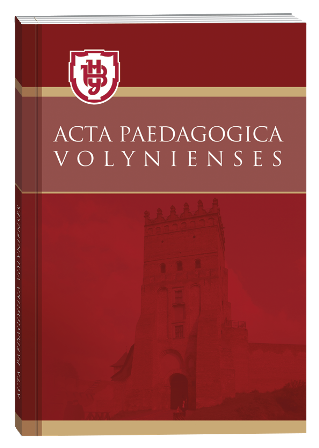MEDIA COMPETENCE AS A MEANS OF SELF-ACTUALISATION OF A YOUNG SCIENTIST
DOI:
https://doi.org/10.32782/apv/2024.3.5Keywords:
media education, media competence, information literacy, self-actualisation, communicationAbstract
Based on a systematic analysis of the regulatory framework for media education and improvement of infomedia literacy of a young scientist, the role and importance of media competence in the practical activities of a young scientist in the context of global digitalisation and informatisation of society is highlighted. It is proved that in the context of the rapid development of information and communication technologies, the ability to critically perceive, analyse and evaluate information for research and personal self-development is extremely important. It is established that media competence allows a modern person to make informed decisions, to be less dependent on destructive influences, to better understand the boundary between reality and the media picture of the world, between fact and manipulation, i.e. to remain themselves and to fight for their own values. It has been found that in order to be successful, young researchers need to develop digital literacy skills: technical, information management, communication and professional ethics. It is a set of such skills that will contribute to the professional development of young researchers and ensure the effectiveness of their scientific research. In addition, a media-competent scientist should be able to effectively express their ideas through various media forms, including scientific articles, presentations, videos and social media. The study found that the professional growth of a young scientist is impossible without such qualities as: structuredness, selectivity, relativity, duality, synergy, accumulativeness, multifunctionality. The set of skills and abilities with online tools forms the personal image of a young scientist in the scientific world, which is realised through publication activity, the number of citations, communication and cooperation with domestic and foreign colleagues, state support and grant funding for research, etc. The purpose of the publication is to argue the importance of developing media competence in the formation of a young scientist. Prospects for further research are the development and implementation of curricula in the field of media education; methodological aspects of the formation and development of media competence of a growing personality.
References
Концепція впровадження медіаосвіти в Україні (нова редакція) / Схвалено постановою Президії Національної академії педагогічних наук України 27 квітня 2016 року [Електронний ресурс]. URL: http://surl.li/usxfsr.
Медіакультура особистості: соціальнопсихологічний підхід: навчальний посібник (2009) / О.Т. Баришполець, Л.А. Найдьонова, Г.В. Мироненко, О.Є. Голубева, В.В. Різун та ін.; за ред. Л.А. Найдьонової, О.Т. Баришпольця. К.: Міленіум, 440 с.
Медіаосвіта соціальних педагогів: навчально-методичний посібник (2014) / автори-укладачі: Г. Я. Майборода, М. М. Матвійчук. Черкаси: ФОП Гордієнко Є.І., 90 с.
Онкович Г. (2014). Професійно-орієнтована медіаосвіта у вищій школі. Вища освіта України. Теоретичний та науково-методичний часопис. № 2(53). К.: Вид-во «Педагогічна преса», С. 80–87 .
Поясок Т., Беспарточна О., Москалик Г., Клецова О. (2023). Формування медіакомпетентності у майбутніх педагогів вищої школи. Професійна освіта. Вісник КрНУ ім. М. Остроградського, 1 (138), С. 168–174.
Чуприна В. Медіакомпетентність як складова професійної компетентності вчителя. [Електронний ресурс]. URL: http://surl.li/hdtnhd







